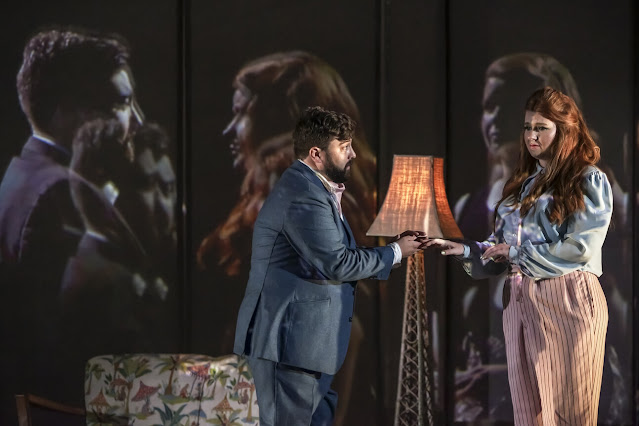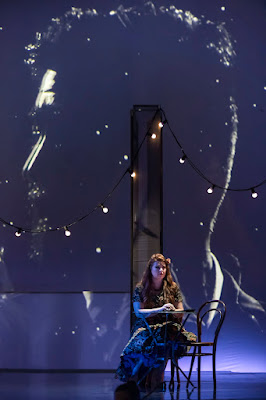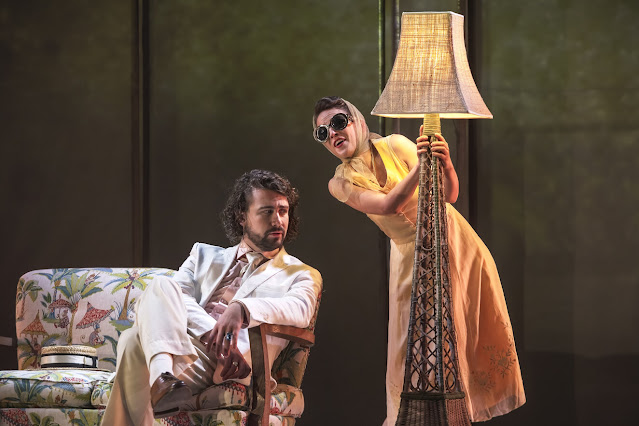 |
| Puccini: La Rondine (Act 3) - Joseph Buckmaster, Meinir Wyn Roberts - IF Opera (Photo Craig Fuller) |
Puccini: La Rondine; Meinir Wyn Roberts, Joseph Buckmaster, Philip Smith, Lorena Paz Nieto, Ryan Vaughan Davies, director: Bruno Ravella, Bristol Ensemble, conductor: Oliver Gooch; IF Opera at Belcombe Court
 |
| Puccini: La Rondine (Act 2) - Meinir Wyn Roberts IF Opera (Photo Craig Fuller) |
Iford Arts, which was founded in 1997 to perform in the gardens of Iford Manor, has a new name, a new CEO, a new venue and a new ethos. As IF Opera under CEO Michael Volpe (late of Opera Holland Park) the company recently opened its Summer 2022 season as Belcombe Court, a very different garden to Iford Manor but an equally ravishing one. From this year, IF Opera has a new ethos too, the company aims to run seasons on a repertory basis with singers taking part in multiple productions, thus giving young artists a range of challenges and opportunities, as well as building a company ethos. This year's season includes Puccini's La Rondine, Donizetti's Rita, Wolf-Ferrari's Susanna's Secret, and Purcell's Dido and Aeneas, plus a family opera.
On Monday 29 August 2022 we caught Bruno Ravella's production of Puccini's La rondine with Oliver Gooch (IF Opera's artistic director) conducting the Bristol Ensemble using Bryan Higgins' orchestral arrangement. Designs were by Flavio Graff, lighting and video by Luca Panetta. Meinir Wyn Roberts was Magda, Joseph Buckmaster was Ruggero, Philip Smith was Rambaldo, Lorena Paz Nieto was Lisette and Ryan Vaughan Davies was Prunier, with Lara Marie Miller, Natasha Page, Shakira Tsindos, Kieran Rayner, Jonathan Forbes Kennedy, and Matteo Placidi.
Puccini's later career saw the composer constantly worrying about the style and the subject matter of his operas, he consciously tried to extend his range both by writing more 'advanced' music (La fanciulla del West) and reaching out to other genres (the comedy of Gianni Schicchi). His agreement to write an operetta for Vienna (quickly finessed into a commedia lyrica, without spoken dialogue) can be seen in this light. The opera features Puccini writing imaginatively yet in a lighter vein for the orchestra (that piano in act one, for instance), and a plot that fails to plumb the emotional depths of his other serious operas. Instead, the characters are drawn with a lighter touch and the ending is perhaps more realistic. Magda, in particular, develops a greater degree of self-awareness than other Puccini's heroines. If you come to the work expecting to go through an emotional wringer, then you will be disappointed, but if you approach it as Puccini's writing in a lighter vein, then it is a complete delight with some terrific tunes.
 |
| Puccini: La Rondine (Act 3) - Ryan Vaughan Devies, Lorena Paz Nieto - IF Opera (Photo Craig Fuller) |
Ravella and Graff set the production loosely in the 1960s which meant some rather striking period costumes and a sense of familiarity to the way Magda goes to relive her youth. One of the points made by Martin Deasy in his article in the programme book is that both Magda and Ruggero fall in love not with each other but with a dream, she with an image from her youth and he with his imagined perfect country girl. In reality, at the end Magda realises she would be stifled and in this version she goes off, seeking her own journey of self-discovery. By accepting this, Ravella ensured that what we experienced was something other than 'La traviata lite', as can sometimes be the case with this opera.
The set was simple yet effective, making good use of the limited stage facilities; just a series of translucent screens and enriched by furniture and props (the scene change from Act One to Act Two deftly handled by the cast). There was just enough detail in the settings to provide all the information we needed, and Luca Panetta's videos evoked Magda's memories, making it clear that she was partly living in the past.
Meinir Wyn Roberts made a lovely Magda, in Act One she projected enough sense of being strongly grounded to suggest her character being somewhat older than the people around her. Her contribution to the song about Doretta in Act One (begun by Ryan Vaughan Davies' Prunier) was beautifully done, but it was as the opera progressed that Wyn Roberts really let rip and brought out the vibrant passion in Puccini's lovely melodies. Throughout she was poised and in control, just as you felt Magda should be. This was no damaged flower, but a woman with a definite view of her destiny.
As Ruggero, Joseph Buckmeister in his button-up suit, was the very image of the country naive in the big city, not stupid but simply inexperienced. He has a very bright, quite high-tension voice with a brilliance of tone to it, and he matched Wyn Roberts finely in their duets, so their big number in Act Two was positively thrilling with both singers bringing a lovely amplitude to their music. The spark between this Magda and this Ruggero did not really crackle, and whilst you can argue that each is in love with a mirage, a bit more emotional tension would have been lovely.
Lorenz Paz Nieto was completely charming as Lisette, throwing off Puccini's coloratura writing with effortless ease and managing to suggest the minx whilst also being sympathetic to her mistress. The comedy of manners and disguise in the Act Two scene at Bullier's was lovely. Throughout the opera, the lively volatile relationship between Lisette and Prunier is important, and both Paz Nieto and Vaughan Davies really sparkled here, and sparks really did fly. Vaughan Davies was a very aesthetic Prunier, almost effete, and delightfully full of himself. He has a fine lyric voice and his verse of the song about Doretta was finely done, and he played the piano part too!
Philip Smith was a fine, upright Rambaldo conveying the sense of him being rather proper. Lara Marie Miller, Natasha Page, and Shakira Tsindos were the three young women, and here you felt that the two sets of characters, the three from Act One and the three grisettes in Act Two almost merged into the same. All three contributed neat dramatic cameos, deftly sketching character to differentiate the one from the other. They were finely partnered by the young men of Kieran Rayner, Jonathan Forbes Kennedy, and Matteo Placidi, with Jordan Harding Pointon was the major domo. The hard-working chorus filled out the scenes and contributed to the vocal richness of the larger scenes.
 |
| Puccini: La Rondine (Act 1) - Ryan Vaughan Davies, Meinir Wyn Roberts - IF Opera (Photo Craig Fuller) |
In the pit, Oliver Gooch deftly mixed an enjoyment of the more transparent textures that the orchestral reduction brought with a sense of dramatic broadening in the bigger moments, so that the big tunes really did have a strong orchestral sweep to them too. And in IF Opera's present temporary theatre structure the sound was full and lively, no sense of compromise here.
This was a terrific start to the company's new format. Going through the cast lists, it is impressive how singers pop up in different roles in the various operas over the season, and the repertoire on show this year demonstrates a willingness to explore different areas. The way Bruno Ravella's production rethought La Rondine was deftly done, and certainly I look forward to what the company does next.
Belcombe Court is a real gem; within walking distance of Bradford railway station, it features a beautifully restored romantic 18th century garden in miniature, full of charm and delight (and the site opens up early enough for you to have a chance to wander round). The whole IF Opera experience was completely magical and well thought out, even down to the fabulous picnic boxes (from Goodness Grazers of Bath) you could order in advance.
Never miss out on future posts by following us
The blog is free, but I'd be delighted if you were to show your appreciation by buying me a coffee.
Elsewhere on this blog
- Two moments in time: String Orchestra of Brooklyn with a work written for 2020's Lockdown, and another evoking the opening of Honolulu's contemporary art museum in 1980 - record review
- Warmth and humanity: British Youth Opera celebrates its 35th anniversary with Vaughan Williams' Sir John in Love - opera review
- The songs of William Busch: revealing the quietly distinctive voice of an underexplored composer - record review
- The curious case of Alan Bush's operas: enormously popular in East Germany in his lifetime, they remain unperformed and unexplored now - feature
- Crossing boundaries between contemporary classical, experimental electronic, ambient and electroacoustic - Matthew Whiteside's Remixes - record review
- Spirit and abandon: Ethel Smyth's Mass at the BBC Proms returns the work home, to the hall where it premiered in 1891 - concert review
- Prom 43: Handel's Solomon from Sofi Jeannin, BBC Singers, the English Concert & Iestyn Davies - concert review
- Different ways of doing things: Michael Wolters' Aria Cuntata and the Low Miracles from Birmingham Record Company - record review
- Seductive craziness: loosely inspired by Martial and Aristophanes, the opera Xeniae by Latvian composer Juris Abols is a polystylistic extravaganza - record review
- Florian Klaus Rumpf takes us on A Mandolin's Guide to Hamburg - record review
- Prom 39: a Turnage premiere, a Vaughan Williams rarity and an Elgar Symphony - concert review
- Ethel Smyth in lighter mode: The Boatswain's Mate returns to the Grimeborn Festival - opera review
- Home











No comments:
Post a Comment